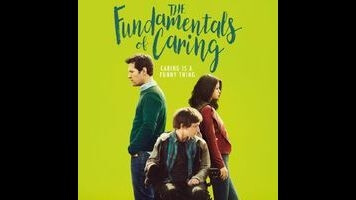Maybe it’s reading too deeply into Netflix’s The Fundamentals Of Caring to wonder whether the film’s initial attempts at a new kind of disability narrative eventually giving way to sentimentality are an attempt to mirror the personality of Trevor (Craig Roberts), a wheelchair-using teen who puts up a jaded front, but deep down is really just another sweaty-palmed teenage boy. Actually, that’s definitely reading too deeply into it, as The Fundamentals Of Caring is about as generic as indie dramedies come. (It even has ukulele on the soundtrack.) That doesn’t make it a bad movie—the cast all turn in convincing performances, and the dialogue is occasionally quite clever—but it doesn’t make it a memorable one either.
A tired-looking Paul Rudd stars as Ben, a failed novelist who takes a job as a caregiver after some initially ill-defined trauma in his personal life. After six weeks of workshops full of helpful acronyms and no discernible medical training, he goes, certificate in hand, to meet Elsa (Jennifer Ehle), a British woman living in Seattle whose 18-year-old son, Trevor, suffers from muscular dystrophy. Trevor is also a cynical prick with an extremely dry sense of humor; whether this sensibility stems from his Britishness or his disability is unclear, and irrelevant besides. Anyway, Trevor is fond of blowjob jokes and “pranks” where he pretends to be choking to death, and Ben gives it right back to him, so they’re fast friends.
Early on in the film, The Fundamentals Of Caring makes some moves towards debunking myths about disabled people, irreverently depicting the humiliating-yet-hilarious minutiae of Ben and Trevor’s daily routines—the logistics of how Trevor goes to the bathroom is the subject of one montage—and revealing Trevor to be as horny, surly, and angsty as any other teenager. Then Ben pushes him to expand his horizons by going on a road trip, and while their playful verbal combat continues, the story starts to take a turn for the precious.
This dichotomy is further embodied in the character of Dot (Selena Gomez), a runaway whose foul mouth is calibrated to contrast with her youthful looks in a way that would be shocking, had the pretty girl who says “fuck” a lot not been a comedy trope for the past couple decades or so. Ben and Trevor pick up the hitchhiking Dot at a cafe somewhere in Montana (or is it Idaho? Either way, the film was shot in Georgia) en route to their destination: The World’s Deepest Pit, chosen by Trevor because he thought it would be funny to drive for a few days to stare at a hole in the ground. She fits right in to their sarcastic, Slim Jim-obsessed little crew, and soon she and Trevor are shamelessly flirting with each other when he’s not staring at her smoking cigarettes out of the van window with a wide-eyed mix of lust and terror.
Along the way, they decide to stop and surprise Trevor’s dad, who abandoned him when he was 3 years old and first diagnosed with muscular dystrophy. If you’re wondering if this daddy issue dovetails neatly with the underlying reasons for Dot’s rebellious streak or Ben’s anxiousness and general sense of world-weary despair, you’re right. If you’re also wondering if, by the end of the film, these issues will be resolved—not in a neat sitcom fashion but just enough that the characters can really start living with a capital “L”—you are right again.
When Ben eventually sits down to write his book about their adventure—which of course he does, not only because you’re watching a movie based on said book but also because that’s what people do in these movies—he calls Trevor a “very special” person. And he is an interesting character, it’s just that the moral of his story fails to live up to that same standard. The book that this film was based on is called The Revised Fundamentals Of Caregiving, which was shortened to The Fundamentals Of Caring, ostensibly for brevity reasons but also so they could make a cute quip about “caring” on the poster. And there you go.

 Keep scrolling for more great stories.
Keep scrolling for more great stories.
